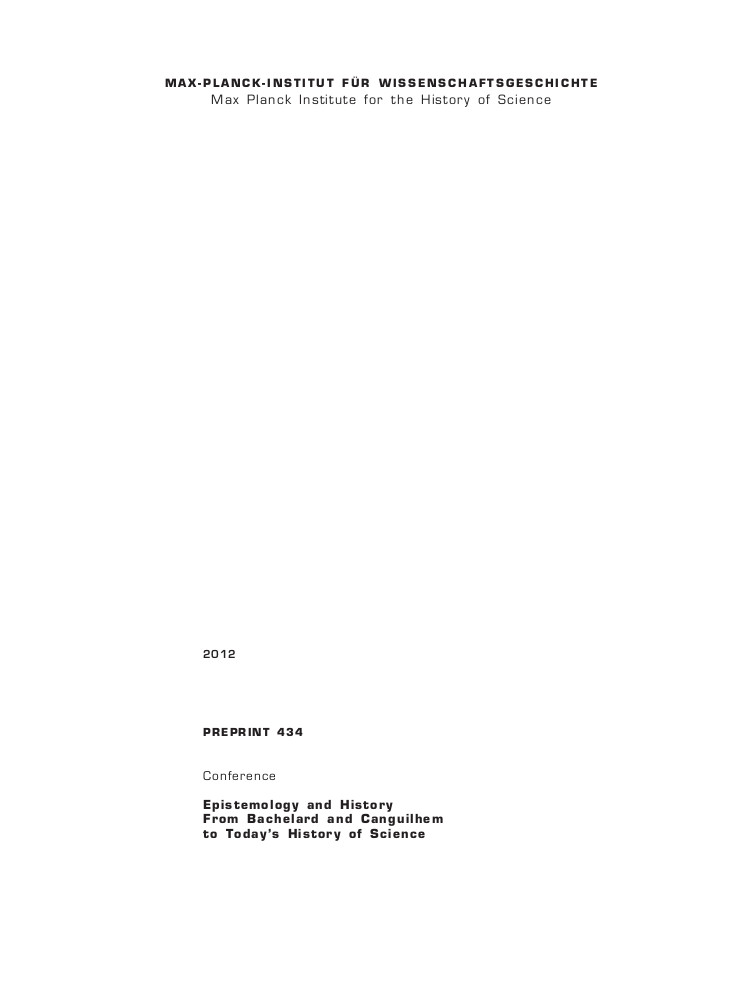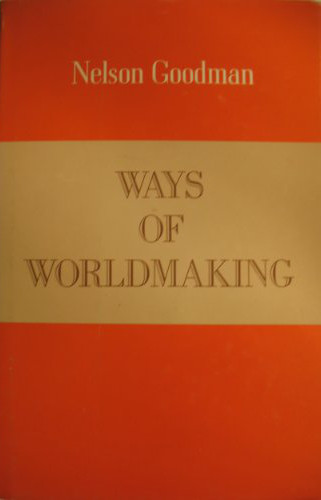Max Planck Institute (ed.): Epistemology and History: From Bachelard and Canguilhem to Today’s History of Science (2012) [EN, FR, DE]
Filed under proceedings | Tags: · discourse, epistemology, historical epistemology, history, history of science, knowledge, philosophy, science, theory

“Over the past few years, “historical epistemology” has had quite a successful international career. Starting with a week-long conference organized by Ian Hacking in Toronto in 1993, historical epistemology was and continues to be used as a label for a wide variety of projects and programs: from Hacking’s own discussion of styles of scientific reasoning to Lorraine Daston’s historicization of epistemological categories and values, Arnold Davidson’s investigations into the conceptual formation of new kinds of knowledge and experience and the attempt undertaken by Peter Damerow et al. to broaden the scope of Jean Piaget’s “genetic epistemology” by historical means.
These conference proceedings attempt to historicize and contextualize historical epistemology and, by the same token, to create a prerequisite for concrete and critical updates.” (from the Introduction)
Contributions by Camille Limoges, François Delaporte, Monika Wulz, Thomas Ebke, Stefanos Geroulanos & Todd Meyers, Claude Debru, Pierre-Olivier Méthot, Françoise Balibar, Sandra Pravica, Cornelius Borck, Andrea Cavazzini, Maria Muhle, Cristina Chimisso, Frieder Otto Wolf, and Anselm Haverkamp.
Publisher Max-Planck Institute for the History of Science, Berlin, 2012
MPG Preprint 434
Open Access
232 pages
PDF (1.4 MB)
Comment (0)Michael Polanyi: The Tacit Dimension (1966–) [EN, DE]
Filed under book | Tags: · epistemology, gestalt theory, knowledge, knowledge production, philosophy, philosophy of science, science, tacit knowledge

“‘I shall reconsider human knowledge by starting from the fact that we can know more than we can tell,’ writes Michael Polanyi, whose work paved the way for the likes of Thomas Kuhn and Karl Popper. The Tacit Dimension argues that tacit knowledge—tradition, inherited practices, implied values, and prejudgments—is a crucial part of scientific knowledge. This volume challenges the assumption that skepticism, rather than established belief, lies at the heart of scientific discovery.”
Publisher Doubleday, Garden City/NY, 1966
104 pages
via James L. Kelley
Commentaries: Steven Shapin (London Review of Books, 2011), CP Goodman (Polanyiana, 2003)
Wikipedia
The Tacit Dimension (English, 1966, no OCR, pp 96-97 missing)
Implizites Wissen (German, trans. Horst Brühmann, 1985, no OCR)
Nelson Goodman: Ways of Worldmaking (1978–) [EN, DE, ES, CZ, CR]
Filed under book | Tags: · aesthetics, art, art theory, epistemology, knowledge, metaphysics, perception, philosophy, representation, science, style, truth

“A major thesis of this book is that the arts must be taken no less seriously than the sciences as modes of discovery, creation, and enlargement of knowledge in the broad sense of advancement of the understanding, and thus that the philosophy of art should be conceived as an integral part of metaphysics and epistemology.” (p 102)
Publisher Hackett Publishing, Indianapolis, 1978
ISBN 0915144514, 9780915144518
148 pages
Reviews: Hilary Putnam (Journal of Philosophy, 1979), W. Charlton (Philosophical Quarterly, 1980), Robert Howell (Philosophical Review, 1982), Jay F. Rosenberg (Noûs, 1982), Jon W. Sharer (Leonardo, 1981).
Commentaries: Xavier de Donato-Rodríguez (Theoria, 2009), Pierre-André Huglo (Philopsis, 2012, FR).
Preface to an Italian edition (Achille C. Varzi, 2008, IT)
Commentary on Goodman’s aesthetics (Stanford Encyclopedia of Philosophy).
Ways of Worldmaking (English, 1978; HTML).
Ways of Worldmaking (English, UK edition by Harvester Press, 1978)
Weisen der Welterzeugung (German, trans. Max Looser, 4th ed., 1984/1998, added on 2014-10-28)
Maneras de hacer mundos (Spanish, trans. Carlos Thiebaut, 1990, no OCR)
Způsoby světatvorby (Czech, trans. Vlastimil Zuska, 1996, first 4 chapters, HTML)
Načini svjetotvorstva (Croatian, trans. Damjan Lalović, 2008)

